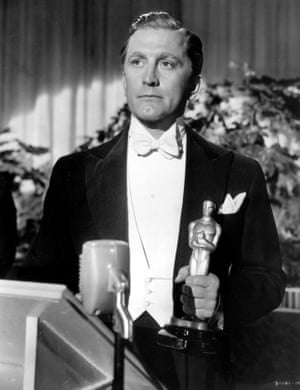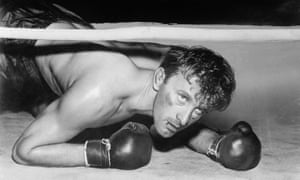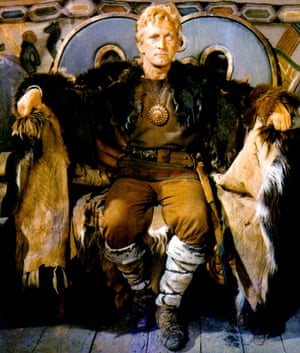Kirk Douglas obituary
by David Thomson
Thu 6 Feb 2020
Without irony or modesty, Kirk Douglas, who has died aged 103, saw himself as the archetypal American, a sturdy bridge between the abyss of the past and the bounty of the new world.
Indeed, he regarded his life story as worthy of some Los Angeleno Sistine chapel where he was posed – savage, muscular, radiant and determined – his arms linking penniless, uneducated immigrants from Russia and, say, his son Michael, a smooth prince of the city, a fabulously successful producer and actor. And I, Kirk would have cried to the fates and the heavens, I am the ragman’s son.
 |
| Kirk Douglas as Vincent van Gogh in Lust for Life, 1956. |
That was the title of his 1988 autobiography, in which he told the story of how an epitome of underprivilege had become world famous – recipient of the presidential medal of freedom, chevalier of the Légion d’Honneur, fulfilling the roles of Van Gogh, Spartacus, Doc Holliday, a one-eyed Viking chieftain, and Jonathan Shields in The Bad and the Beautiful, that model of Hollywood confidence, arrogance and alchemy who knows that being bad has its own fatal allure.
His autobiography stopped short of the night in 1996 when Douglas, gaunt and wrestling with the after-effects of a stroke, at last received his first Oscar – an honorary one at that – and told the world that he was proud.
No actor now would dare to perform with the zest and belief that drove him. In Douglas, we can recognise a kind of acting that seems as antique, as “period”, precious and charming as the way the Gish sisters fluttered their hands and widened their eyes in the silent era. No one now is capable of the fun that Douglas had, or all the conviction he brought to good work and garbage alike. But he was Kirk Douglas – and others were not.
However, to begin with, he wasn’t Kirk at all. He was born Issur Danielovitch in Amsterdam, upstate New York, the son of Russian Jews, Herschel, a ragman who changed his name to Harry Demsky, and Bryna (nee Sanglel). The couple had only lately arrived from what is now Belarus – at the time a serious handicap to getting ahead. Yet Issur’s upbringing was founded upon the preposterous gamble that ambition (and competitiveness) would bring success. That was the American way.He worked his way through St Lawrence University under the name Isidore Demsky, then found employment as a professional wrestler while he took classes at the American Academy of Dramatic Arts in New York City. The wrestling was not just by necessity. Young and old, he was intensely physical, an intimidating presence (though not a big man), who always seemed capable of menace, danger and power.
 |
| Kirk Douglas in The Heroes of Telemark, 1965. |
He was uncertain only about his name, for it was under the pseudonym George Spelvin Jr that he made his Broadway debut in a production of Spring Again, in 1941. After a few more plays, he had a couple of second world war years in the US navy as a lieutenant, before being discharged on medical grounds. Thus, he was already 30 before he made his movie debut (as Kirk Douglas), playing a bespectacled and repressed weakling in The Strange Love of Martha Ivers (1946). The story goes that this break owed a good deal to his early friendship with a drama school classmate, Betty Perske, who would become Lauren Bacall.
He was not at all bad, and it did not take long for the business to appreciate his huge energy and innate gift for what could be termed facial swashbuckling. His face was handsome until he grinned. Then he became a kind of Mr Punch. And when he spoke, the voice was poised to growl and roar. It had its own passionate vibrato – much taken up by comics and impersonators – but utterly natural in Douglas. Indeed, it was a force of will that seemed to come from a large man. His voice could be heroic, threatening, sardonic, merciless, epic or self-loathing – but it seldom meddled in the ordinary.
Douglas was seen to great advantage as the villain in Jacques Tourneur’s Out of the Past (1947), a man whose every smile seemed a more reliable portent of rage and violence. For a few years, he was tricky to cast, not quite hero or villain. But in 1949, he seized on the role of the ruthless boxer in Champion. This was an unreservedly nasty guy, redeemed only by his energy, his winning and his flawless determination. The movie’s script (by Carl Foreman) was meant as a warning about boxing, corruption and even ambition itself, but Douglas made the man a pioneer to later raging bulls, and he deserved his best actor Oscar nomination.
 |
| Kirk Douglas |
More important, Champion defined his star quality as a grinning villain, a rough-edged hero or a driven careerist. Over the next few years, he had the roles that established him. As the trumpet player in Young Man With a Horn (1950), supposedly inspired by Bix Beiderbecke (and dubbed by Harry James), he handled the horn in the way gangsters held guns. His wife in that film was played by Bacall in a thankless and unpleasant role.
Over the next two years, he was the “gentleman caller” in the Gertrude Lawrence version of The Glass Menagerie; a western hero facing a desert ordeal in Along the Great Divide; the vicious, manipulative reporter in Billy Wilder’s Ace in the Hole; a neurotic cop having a breakdown in Detective Story; a Howard Hawks hero in The Big Sky; and then Shields in Vincente Minnelli’s The Bad and the Beautiful.
He got another Oscar nomination for his depiction of Shields, that flamboyant, conniving rascal of charm, a figure allegedly based on the Gone With the Wind producer David O Selznick, but really a tribute to the necessary piracy (in Hollywood’s opinion) of its own “creative” process. There could as easily have been nominations for Detective Story or Ace in the Hole, projects in which Douglas explored the darker sides of supposedly stalwart professions. That he died in both films – and died horribly – was a measure of his own commitment, as well as his fascination with pain. Few leading actors have enjoyed so many deaths and mutilations on screen.
By 1953, he was unquestionably a star, though not every film was well chosen. He was a trapeze artist with Pier Angeli in a scene from The Story of Three Loves (1953) which, along with Strangers When We Meet (1960), was his best love story. He was a rowdy sailor in 20,000 Leagues Under the Sea and was in Italy to make Ulysses (both 1954); he appeared in Man Without a Star for King Vidor (wrapped up in barbed wire in one scene); in The Indian Fighter; and was a racing car driver in The Racers (all 1955).
 |
| Kirk Douglas |
But then, in 1956, with a face that was astonishingly suited to the self-portraits, he became Vincent van Gogh in Minnelli’s Lust for Life. The passion of that film has not dated, in part because Minnelli trusted the paintings, the European locations and the importance of the painter’s relationship with his younger brother, Theo. Douglas was superb and tragic in the role. For once there was no question about the validity of his self-destructive urges. He won a third best actor nomination, losing out to Yul Brynner in The King and I (other nominees that year were James Dean and Rock Hudson in Giant and Laurence Olivier as Richard III.)
In 1955 Douglas formed his own production company, Bryna, and took an increasing interest in, and profit from, the business. He tried a rather dismal romantic comedy, Top Secret Affair (1957), but he was always funnier in scary moments. So he relied on action pictures and westerns: Gunfight at the OK Corral (1957), The Vikings (1958), Last Train from Gun Hill (1959), a strange version of The Devil’s Disciple (1959) and The Last Sunset (1961).
During this period he fell in with Stanley Kubrick and played the first world war soldier-lawyer in Paths of Glory (1957), a brave Bryna production. That led to Kubrick being hired to replace Anthony Mann on the apple of Douglas’s eye, Spartacus (1960). He loved the Howard Fast novel for its epic potential, but also because he identified with slaves who won their freedom. “I come from a race of slaves. That would have been my family, me,” he said in his autobiography.
In addition, Douglas helped crack the anti-communist blacklist by hiring Dalton Trumbo to do the screenplay. The film shows his earnestness – it is, really, Douglas’s picture more than Kubrick’s – as well as his weakness for overdoing things. But Spartacus stands as a revealing portrait of a kind of naive Hollywood liberalism, pro-slave in all its sentiments, yet unerringly Roman at heart. For Douglas was by then an aristocrat who had no interest in giving up all he had won (except by charitable contribution). The picture was a commercial hit, but it won only one significant Oscar – best supporting actor for Peter Ustinov as the cynical slave-trader.
It would seem that Douglas never worked as hard again, and he was surely pained that Spartacus was not even nominated for best picture. As an actor, he did more good work, though he was not quite as energised in Lonely Are the Brave (1962), one of his personal favourites; playing Shields again in Two Weeks in Another Town (1962); overshadowed by Burt Lancaster in Seven Days in May (1964); in Harm’s Way (1965); The Heroes of Telemark (1965); outstanding in Elia Kazan’s The Arrangement (1969); and There Was a Crooked Man (1970).
Douglas had another burning cause in those years. He had helped get a play made out of Ken Kesey’s novel One Flew Over the Cuckoo’s Nest, and he had himself played its lead role – Randle P McMurphy, mad genius, slave leader, rebel and doomed hero – when it opened on Broadway in 1963. For years he tried to get it turned into a film, but without success. He eventually gave the project to his son Michael, and the film won five Oscars in 1976 – best picture, best actor, for Jack Nicholson’s McMurphy, and best actress, director and screenplay.
By then Douglas, nearly 60, was out of fashion. He directed occasionally – Scalawag (1973) and Posse (1975) – and he acted still, but seldom in good projects. Indeed, his most striking late work was on television, in Amos (1985), playing an old man at war with the care home where he lives. It was, in truth, a remake of One Flew Over the Cuckoo’s Nest, produced by another of his sons, Peter.
 |
| Kirk Douglas |
However, in the late 1980s he branched out into books, publishing a bestselling novel, Dance With the Devil, in 1991. That same year he received the American Film Institute’s Life Achievement award. Five years later came the honorary Oscar and his serious stroke. But, as his recovery proceeded, he wrote several other books, including My Stroke of Luck (2003), and appeared in a few more films – Diamonds (1999) and It Runs in the Family (2003). And in 2009, at 92, he did a one-man stage show, Before I Forget, which was made into a documentary film.
Douglas was a competitor, a striver, as urgent as that soaring voice. He made only a handful of great films, but he was a blazing star, opposed to slavery or submission, even if it meant becoming a Bel Air millionaire. In his final decades, he was swept up by his Jewishness. It had always been there, of course, but now he seized upon it like a new role. At the age of 83, he had a second barmitzvah and when asked (by the critic and editor Leon Wieseltier) whether he had always followed the dietary prescriptions of Yom Kippur when working, he replied: “I did, and you have no idea the difficulty in making love to Lana Turner on an empty stomach.”
Douglas married Diana Dill, an acting school classmate, in 1943; they divorced eight years later. In 1954 he married Ann Buydens, and she survives him along with their son, Peter, and the sons from his first marriage, Michael and Joel. Another son from his second marriage, Eric, died in 2004.
• Kirk Douglas (Issur Danielovitch), actor, born 9 December 1916; died 5 February 2020
THE GUARDIAN
FICCIONES
DE OTROS MUNDOS
DRAGON
PESSOA
RIMBAUD
DANTE







No comments:
Post a Comment